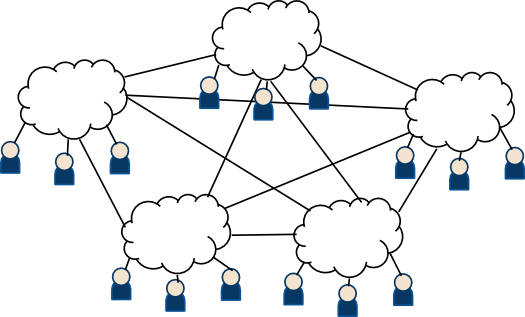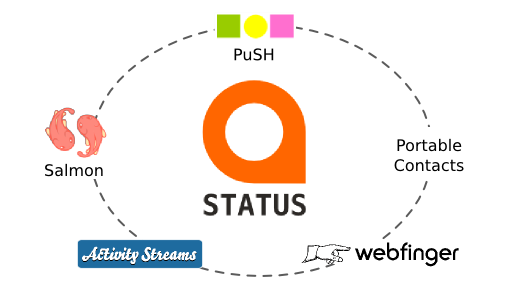The current popular breed of social networking services are closed networks which don't connect with each other. If a user from one network wants to connect with a user on another network, they generally have to sign up for an account with the second network. This inconvenience ultimately results in a few very large networks with an inordinate amount of control over peoples' most personal data and a lack of choice and privacy for users.


Distributed Social Networking
Things have moved on a little since 2007 and a new collection of protocols has now emerged to allow near real time publishing of "activity streams" which can be discovered and commented upon within a social graph in an open, distributed way. You can think of this as a Facebook news feed, but without Facebook. Users will be able to choose from a whole range of different social networking services (or even run their own), and connect with their friends on different networks. Your news feed can then aggregate information from all of the people you're following across a range of different networks, update you about what's going on in near real time and allow you to send a response from your network to theirs.
OStatus is a collective name given to a suite of existing protocols which make this possible. They include:
- PubSubHubbub – Real-time publishing ("PuSH")
- ActivityStreams – Represent social actions in XML with Atom
- Salmon – "Upstream" comments and replies
- Portable Contacts – Social graph and contact data sharing
- WebFinger – XML representation of a user's identity in terms of the services they use

The OStatus standardisation process is just getting started to define how these existing protocols can work together, but sites like Google Buzz, StatusNet, WordPress.com, and Tumblr are already implementing some or all of the protocols.
There are lots of projects which are working on the idea of distributed social networking. One which has attracted a lot of attention in the press recently is Diaspora which was recently started by a group of four students from New York University thanks to funds raised with an online campaign. The Diaspora team hasn't released any code yet, but they have committed to supporting OStatus. There are many other similar projects, including but not limited to:
- StatusNet
- Google Buzz
- DiSo
- Elgg
- GNU Social
- The Mine Project
- Appleseed
- OneSocialWeb
- NoseRub
- BuddyPress
- Cliqset
- Gowalla
- Posterous
Hopefully OStatus and some or all of these projects can do for social networking what SMTP & Sendmail did for email, what HTTP/HTML and Apache did for document sharing and what RSS/Atom and WordPress did for blogging. If just some of these projects choose to support the OStatus group of protocols (some of them already have), then the social web will be a much more open place!
See OStatus.org and a presentation by Even Prodromou for more information.

Hello, I am doing a video called “GNU Social under the hood”, I’d say I am about 75% finish with it. I came across these standards recently so I am learning them as I go and then making a video as I learn. Its very likely I might make mistakes so I kinda want to run the video by somebody with more experience.
It seems you caught these standards very early. I am wondering if you would like to cross examine the video transcript and slides before I publish it. I’d like somebody to tell me if I am making mistakes or misleading people. I would like the video to have some merit. I am just about finished with the OStatus part and all of its components.